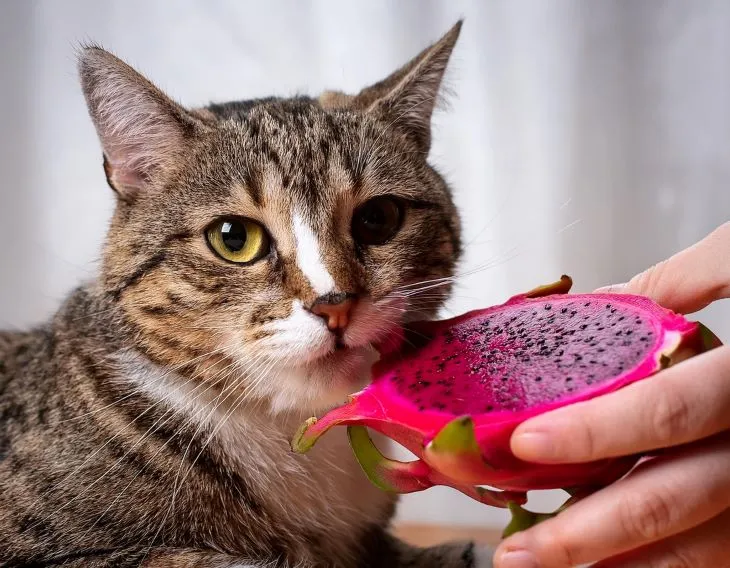Is Dragon Fruit Safe For Cats? Benefits, Risks And Expert Feeding Tips
By: Lana Koh

The information in this article is intended to educate cat parents and is not a substitute for veterinary guidance. In case of any concerns about your cat’s health, please talk with your veterinarian.
Can cats eat dragon fruit? If you are unsure about it then please note that the short answer is Yes—it’s safe in small amounts! Dragon fruit, or pitaya, is a vibrant pink fruit packed with nutrients. While it’s generally safe, it should only be given as an occasional treat due to cats’ sensitive digestive systems and specific dietary needs. Here’s what to know before offering your feline friend a taste.
What Is Dragon Fruit?
Dragon fruit, also known as pitaya, is a tropical fruit from a cactus plant. Known for its bright pink skin and white or red flesh speckled with tiny black seeds, dragon fruit has gained popularity for its mild, slightly sweet taste and health benefits. In terms of nutrition, dragon fruit is low in calories but contains vitamins like C, fiber, and antioxidants. While these are valuable for humans, their impact on cats is less significant.
Can Cats Eat Dragon Fruit?
Veterinarians widely acknowledge that dragon fruit is safe for cats, as it contains no harmful substances. However, moderation is crucial to prevent any potential digestive issues. While cats might not show a strong interest in this fruit, if they do take a few bites, there’s generally no cause for concern about their health.
Is Dragon Fruit Safe For Cats?
The good news is that dragon fruit is not toxic to cats. However, it’s essential to recognize that cats are obligate carnivores, meaning their bodies thrive on animal-based proteins rather than fruits or vegetables. Although dragon fruit doesn’t harm cats, it doesn’t provide essential nutrition either. Small amounts as an occasional treat are safe, but it should never replace a cat’s primary meat-based diet.
Potential Benefits Of Dragon Fruit For Cats
While not necessary in a cat’s diet, a tiny bit of dragon fruit may provide some minor benefits:
1. Hydration
With its high water content, dragon fruit can be a refreshing treat, especially for cats who may need extra hydration. This can be particularly beneficial for cats that aren’t natural water drinkers.
2. Antioxidants
The antioxidants in dragon fruit help fight inflammation and free radicals. Although cats don’t require antioxidants in the same way as humans, these compounds are safe for them in small amounts.
3. Fiber
Fiber can aid in digestion and might benefit cats that experience occasional constipation. However, there are other more suitable fiber sources specifically formulated for feline digestion.
Risks Of Feeding Dragon Fruit To Cats
Even though dragon fruit is non-toxic, there are potential downsides to keep in mind:
1. Digestive Upset
Cats have sensitive stomachs, and introducing new foods can lead to digestive issues like vomiting or diarrhea. If your cat eats too much dragon fruit, it may cause gastrointestinal discomfort.
2. High Sugar Content
Dragon fruit contains natural sugars, which can lead to weight gain if consumed frequently. It’s essential to limit sugary fruits, as excessive sugar is not beneficial to a cat’s diet.
3. Choking Hazard
While the seeds in dragon fruit are generally safe, it’s always wise to cut the fruit into small, manageable pieces to prevent choking.
4. Allergic Reactions
Although rare, some cats may have allergies to some foods. Watch for signs like itching, facial swelling, or difficulty breathing after eating dragon fruit. If any of these symptoms appear, discontinue and contact your vet.
How To Feed Dragon Fruit To Your Cat
To ensure your cat’s safety, follow these guidelines when offering dragon fruit:
1. Preparation Step
- Wash the fruit thoroughly to remove any surface contaminants.
- Remove the outer skin entirely (it’s tough and not digestible).
- Cut the flesh into small, bite-sized pieces.
2. Serving Size
- First-time serving: Start with a tiny piece, about the size of a pea.
- Maximum serving: Offer 1-2 small pieces occasionally.
- Frequency: Limit to once a week or less to avoid digestive issues.
Alternatives To Dragon Fruit For Cats
If your cat enjoys sampling fruits but dragon fruit doesn’t agree with them, here are safer alternatives to consider:
- Blueberries: Low in sugar, with antioxidant benefits.
- Bananas: Rich in potassium, but offer in moderation.
- Apples: Only give the flesh; avoid seeds as they are toxic to cats.
- Strawberries: Sweet and safe in small portions.
- Watermelon: High in water content; make sure to remove seeds.
Remember, all fruits should only be offered occasionally and in minimal amounts, as cats primarily need meat-based nutrition.
Important Points About Cats And Fruits
It’s crucial to remember these key points when considering fruits as treats for your cat:
- Cats don’t need fruits for their nutritional needs; they are obligate carnivores.
- Treats should make up only about 10% of their total daily intake.
- Always introduce new foods slowly to monitor for any adverse reactions.
- Prioritize a meat-based diet as the foundation of your cat’s nutrition.
Frequently Asked Questions
Final Thoughts
While dragon fruit is a safe, non-toxic fruit that can occasionally add variety to your cat’s diet, it doesn’t offer significant nutritional benefits for them. Cats need a meat-focused diet to thrive, and too much dragon fruit could lead to digestive issues. If your cat shows an interest, a small, occasional piece can be a fun treat, but always consult your vet before introducing new foods, especially if your cat has health conditions or takes medications.

About the Author
Lana Koh
Lana is a passionate cat lover with years of experience caring for her feline companions. As a dedicated volunteer at animal shelters, she’s gained valuable insights into the world of cats. Lana channels her love and knowledge into writing informative and engaging articles for fellow pet owners, covering topics like cat health, nutrition, grooming, behavior, and the special bond we share with our feline friends.
